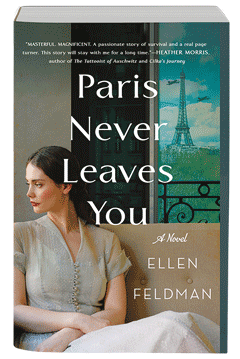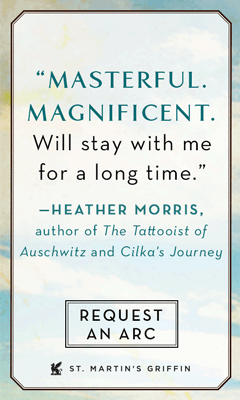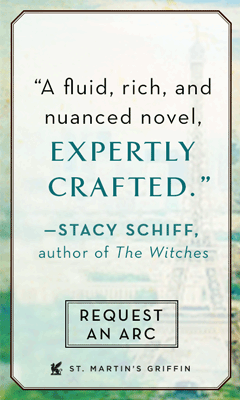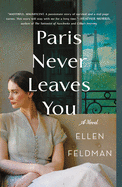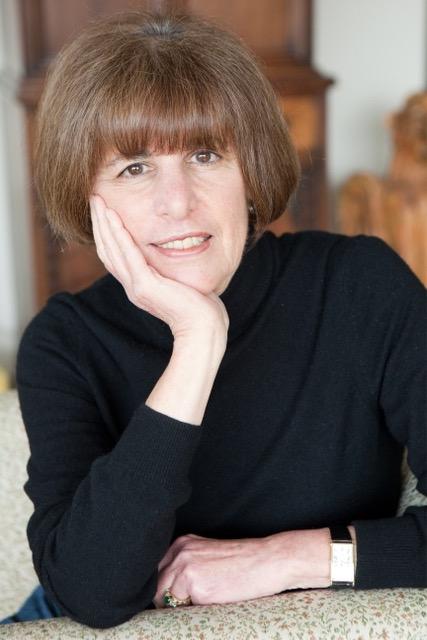Paris Never Leaves You
by Ellen Feldman
With a sweeping narrative that spans Paris during the Nazi Occupation and New York City a decade later, Paris Never Leaves You is an unforgettable story of resistance, trust, faith and love. Starting with the novel's opening pages, Guggenheim fellow Ellen Feldman (Next to Love; Terrible Virtue; Scottsboro) immediately grabs readers' hearts and never lets go.
In 1944, Charlotte Foret is a young widow and mother working in a Paris bookshop while the city is under siege. One day, a Nazi soldier enters the bookstore and begins browsing quietly. Charlotte is fearful, and wary of his motives. During his repeated visits to the store, he often brings smuggled food for Charlotte and her 18-month-old daughter, Vivi. Charlotte gradually learns his name--Julian Bauer--and that he is a physician as well as a soldier. As Paris becomes increasingly dangerous, Charlotte realizes that her and Vivi's best chances for surviving the war mean putting their complete trust in Julian, even if it requires that Charlotte must make an unthinkable, immoral and life-changing decision.
Ten years later, Charlotte is a highly respected editor at the prestigious, male-dominated New York publishing house of Gibbon & Field. At the firm's helm is Horace Field, an old friend of Charlotte's father who sponsored her and Vivi's passage to America after the war ended. Charlotte owes everything that they have in their new life to Horace. In addition to working for Horace, Charlotte and Vivi live on the upper floor of the large home that he shares with his emotionally distant and resentful wife, Hannah, a psychoanalyst.
For more than a decade, Charlotte has remained guarded and vigilant against the painful memories of the death of Vivi's father, her relationship with Julian and the guilt she feels about perpetuating a deception during a desperate time. An inquisitive, smart teenager, Vivi begins asking questions and is the target of anti-Semitism at school. When mysterious letters start arriving for Charlotte at the office, her strong façade cracks, and she turns to the closest person to her--Horace--who also knows what it is like to be haunted by what happened during the war.
While they share a bond that extends beyond their living arrangements and their professional connection, Charlotte and Horace both remain fiercely protective and secretive: "No one but a fool would try to erase the past. The only hope was to stand guard against it." Horace also lives with his own physical and emotional wartime scars: he is a wheelchair-bound Medal of Honor recipient. Everyone believes that he received his wounds for valiant reasons. "It wasn't a mission, only a battle, and there was nothing heroic about it, but a heroic mission makes for a better story, and we're in the business of selling stories," Horace confesses to Charlotte.
Feldman's decision to set Paris Never Leaves You in the publishing world reflects the idea that all of us, like Charlotte and Horace, are "in the business of selling stories." Each of the characters must answer the same question that Feldman is asking of her readers: What is the story that we're selling to ourselves and to the world? Are they the same or different stories? Regardless of individual circumstances, everyone has a secret shame, a hidden truth or a concocted falsehood that remains unspoken. Those are the experiences destined to haunt us forever, imprinted upon our souls.
Paris Never Leaves You also prompts an excavation of what it means to be deceptive or untruthful, and whether there are circumstances, such as saving someone's life, that provide more leniency for such deception. The demarcation line where the answer lies can only be determined by each of us, Feldman seems to be saying. Charlotte presents one persona to the world and to her daughter, but internally wrestles with another version of herself. Julian is plagued by the dichotomy between the man he shows to the world and the man he perceives himself to be. Hannah has little self-awareness and feels compelled to always maintain her public persona, even with her husband. Though Horace perhaps views himself as he is, he cannot forgive himself for his actions during the war and won't give anyone else a chance to do so. Is it ever possible, Feldman asks, to make peace with our past?
The best works of historical fiction have a way of illuminating the present, allowing readers to better understand themselves through well-defined characters reflected in the prism of time. In Paris Never Leaves You, Ellen Feldman does this beautifully in a multi-layered, tender story that explores the emotionally charged, often parallel terrains of truth, deception, love and heartbreak. --Melissa Firman



